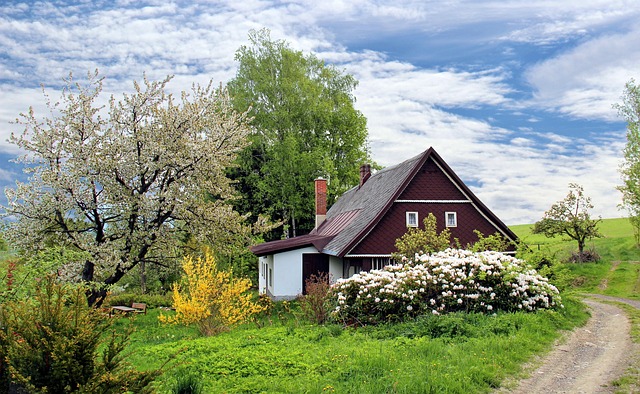Seasonal garden maintenance is key to a thriving landscape. Spring prepares with thorough cleaning, pruning, and adjusting fertilizers; summer involves attentive watering, pest control, and mulching; fall cleanup removes dead matter and prunes perennials; and winter protection includes wrapping plants, regular pruning, balanced fertilizers, and strategic cleanup to ensure vibrant growth come spring.
Combating pests and weeds is an essential part of seasonal garden maintenance. This guide navigates through the year-round challenges, offering tailored solutions for each season. From spring’s healthy start with cultiving techniques to summer’s watering wisdom, fall’s cleanup strategies, and winter’s protective measures, we explore fertilizing schedules, mulching, and effective pest control methods. Implement these tips to safeguard your plants and foster a vibrant garden throughout all seasons.
- Spring Garden Preparation: Cultivating a Healthy Start
- Summer Watering Tips: Nurturing Plants Amidst the Heat
- Fall Cleanup Strategies: Preparing for Winter's Slumber
- Winter Garden Protection & Pruning: Safeguarding Your Plants Year-Round
Spring Garden Preparation: Cultivating a Healthy Start

Spring marks a fresh start for your garden, making it an ideal time for preparation. Before the growing season kicks in, focus on cultivating a healthy foundation. Start with a thorough cleanup from the previous season, removing any dead plants and weeds to prevent pest breeding grounds. This initial step is crucial for ensuring your garden’s overall health.
Prune seasonal plants and trees while they’re still dormant, as this encourages new growth. Adjust your fertilizing schedule according to spring’s arrival; apply a balanced fertilizer to provide essential nutrients for robust plant development. Additionally, consider incorporating mulching techniques to retain moisture, regulate soil temperature, and suppress weed growth throughout the warmer months. These early actions set the tone for successful seasonal garden maintenance.
Summer Watering Tips: Nurturing Plants Amidst the Heat

During the summer, maintaining a robust and healthy garden requires attentive watering practices. As temperatures soar, it’s crucial to adapt your watering schedule to meet the increased water needs of plants. Early morning or late evening are the best times to water, as cooler temperatures reduce evaporation rates. Ensure you water deeply but less frequently to encourage deep root growth, which makes plants more resilient during hot spells. Regular deep watering is better than frequent shallow waters as it promotes a strong root system that can access water and nutrients from deeper in the soil profile.
In addition to adequate watering, consider adjusting your fertilizing schedule. Summer is typically a period of active growth for many plants, so applying a balanced fertilizer can enhance their health and appearance. Also, don’t forget the importance of seasonal pest control; monitor your garden for common summer pests like aphids, whiteflies, and spider mites, and take appropriate action using organic or chemical treatments as needed. Lastly, mulching around plants provides essential insulation against extreme heat, preserves moisture in the soil, and suppresses weeds that compete for nutrients and water.
Fall Cleanup Strategies: Preparing for Winter's Slumber

As autumn winds down, preparing your garden for winter sleep is essential for a healthy spring awakening. Fall cleanup strategies involve removing dead plant matter, cutting back perennials, and pruning seasonal plants to prevent pest and disease issues. This process not only enhances air circulation but also helps control pests like aphids and beetles that thrive in decaying plant material. Remember that proper timing is crucial; wait until after the first frost to prune most plants to avoid damaging them during cold snaps.
During this season, focus on tasks like raking leaves, trimming hedges, and deep watering established plants to prepare them for winter. Apply organic fertilizers in late fall, as nutrients are less likely to leach out due to colder temperatures. Mulching around plants can also protect roots from extreme cold and prevent weeds from sprouting. Consider using natural pest controls like neem oil or beneficial insects to manage any remaining pests before the garden goes dormant, ensuring a thriving garden come spring.
Winter Garden Protection & Pruning: Safeguarding Your Plants Year-Round

Winter is a crucial time for garden maintenance, often overlooked but essential for safeguarding your plants. As temperatures drop, protecting your flora from cold damage becomes paramount. One effective strategy is to wrap sensitive plants with protective fabric or mulch, creating an insulation layer that shields them from extreme frosts. Additionally, pruning is a vital task during winter months; removing dead or diseased branches not only enhances the plant’s appearance but also improves its health and resilience against pests. This process should be done regularly throughout the year, as it helps to maintain the garden’s overall well-being.
While preparing for spring, starting with fertilizing schedules becomes essential. Different seasons demand varying nutrient requirements, so tailoring your fertilizer application accordingly is key. In spring, focus on encouraging new growth and flowering by using a balanced fertilizer. As summer approaches, proper watering techniques come into play. Regular, deep watering promotes robust plant health, but be mindful not to overdo it, as excessive water can attract pests. Fall cleanup strategies are also vital; removing spent flowers and leaves prevents pest breeding grounds and prepares your garden for the next season. Mulching plays a significant role here, too, helping to retain soil moisture and regulate temperature during the changing seasons.
Maintaining a thriving garden throughout the year requires proactive seasonal care. By implementing effective spring garden preparation, including cultivating healthy soil and establishing fertilizing schedules, you lay the foundation for robust plant growth. Summer watering tips are crucial for keeping plants hydrated during hot spells, while fall cleanup strategies ensure a peaceful transition to winter. Protecting your garden in winter through pruning and mulching is essential for safeguarding sensitive plants. Embrace these seasonal garden maintenance practices to foster a lush, vibrant outdoor space all year round.
